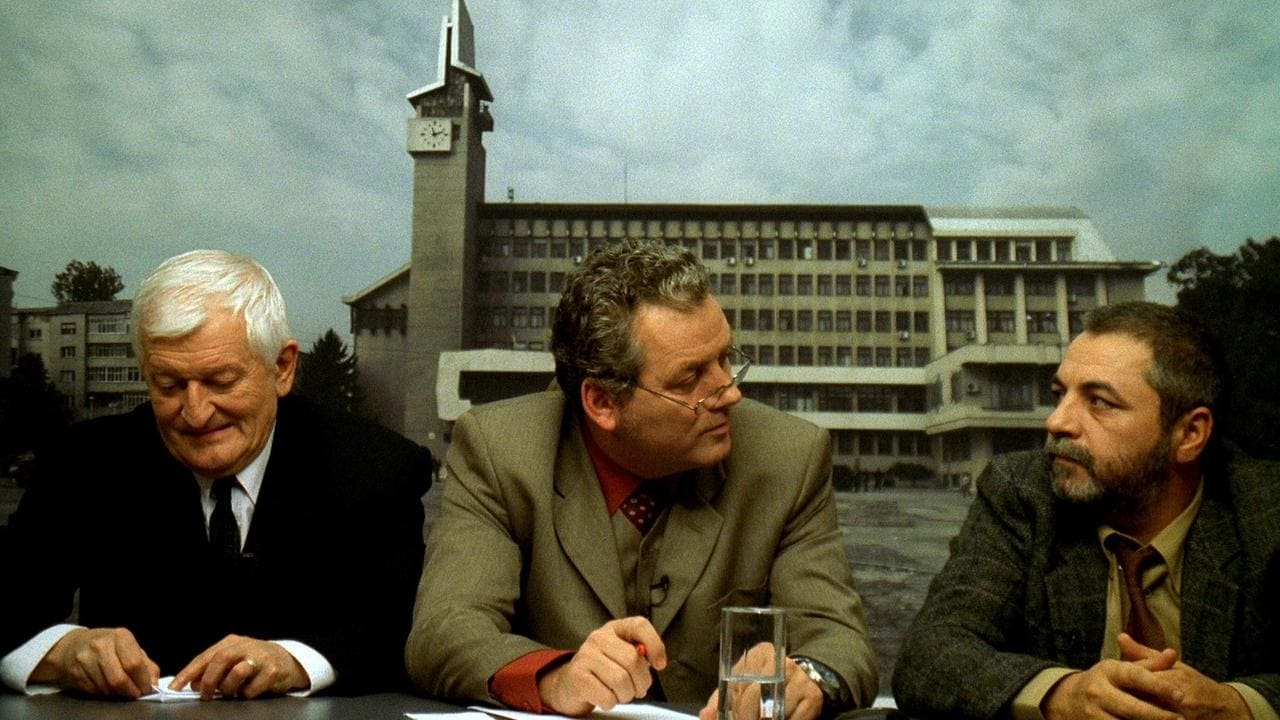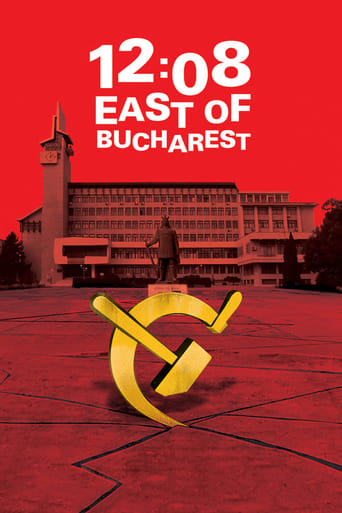Matcollis
This Movie Can Only Be Described With One Word.
Thehibikiew
Not even bad in a good way
Dynamixor
The performances transcend the film's tropes, grounding it in characters that feel more complete than this subgenre often produces.
Chirphymium
It's entirely possible that sending the audience out feeling lousy was intentional
Roland E. Zwick
"12:08 East of Bucharest" is a droll Romanian comedy that deftly examines how the citizens of that country look back on one of the pivotal events in their nation's history.The movie takes place 16 years to the day (December 22, 1989) after the Communist government, led by Nikolai Ceausescu, was overthrown in that country. Now, Jderescu, the host of a local TV talk show, is hoping to commemorate that anniversary by examining what role his own town might have played in that seminal event. The issue Jderescu hopes to settle is whether a revolution actually took place in their town or whether the citizens simply waited till it was "safe" - i.e. after Ceausescu had already fled the scene by helicopter at precisely 12:08 PM on that fateful day - before venturing out in protest. Jderescu has chosen to have two "common folk" guests on his show to discuss the matter - an alcoholic history teacher named Manescu, and a cranky retired old man named Piscoci. Manescu at first tries to pass himself off as a hero, claiming that he and a group of friends headed over to the town square before the downfall of the government, but conflicting testimony from some of the callers to the show begins to call into question the truthfulness of his story."12:08 East of Bucharest" feels a bit like two movies combined into one. The first is a casually paced, noncommittal look into the everyday lives of three citizens of this town. We see Jderescu having breakfast with his wife, making phone calls to re-confirm the guests for his show, and spending time with his mistress, a beautiful young reporter at the station where he works. Manescu struggles with a hangover from the night before, visits the bar to pay his tab, apologizes to a Chinese merchant he insulted while drunk, and contends with a bunch of recalcitrant students who would much rather be setting off firecrackers in the hallway than learning about the Romanian Revolution (though they all seem to know about the French Revolution well enough). Meanwhile, Piscoci divides his time between fighting with his television set and buying a Santa Claus suit for an upcoming children's party at which he's been asked to perform. Writer/director Comeliu Porumboiu has filmed this section almost entirely in medium and long shots with virtually no close-ups or cutting within scenes. The advantage of this naturalistic approach is that it allows the scenes to play out in what feels like real time, while the disadvantage is that it distances us somewhat from the characters, making it harder for us to identify with them and the things we see them doing.Still, this section helps us to better understand why a man like Manescu might feel compelled to place himself center stage at an event of such profoundly historic magnitude. Perhaps it affords him the opportunity at long last of being an active participant in history, rather than a mere teacher of it. We all create new identities for ourselves, Porumboiu seems to be arguing in his film, for who among us wants to be known as nothing more than a face in the crowd, a person ground down to nothing by the prosaic realities of our humdrum existence? Heck, even Jderescu, the talk show host, is finally unmasked on-air for the mere textile worker he was in the years before the revolution. Apparently, personal reinvention is not something exclusive to movie actors and rock stars anymore.However, it's when we get to the talk show itself that the movie truly begins to engage our interest. As caller after caller deflates Manescu's attempts at making himself out to be the hero he probably wasn't, we get the sense that Porumboiu is implying that the issue itself may not even be worth debating all these years later. Just because Manescu and his fellow unarmed citizens didn't risk their lives by confronting the Communist military doesn't make them bad people. Still, there's no denying that Manescu's appearance on the show brings to the surface a whole host of feelings on the part of the general populace regarding the part each of them played in the revolution. By opening up this dialogue, the movie, I imagine, serves a healing function for the Romanian people. What matters for the rest of us is that the movie raises these issues with so much genuine humor and compassion that the dilemma becomes instantly recognizable for viewers the world over.
dromasca
The maturity and complexity of the cinema shown by Corneliu Prumboiu in this first film is amazing. In one strike he finds his place in the first ranks of the Romanian 'new wave' - one of the most interesting cinema schools that has emerged in the last few years.The story is divided into two. In the first part we see the principal characters preparing for a TV debate about the events that led 16 years earlier to the change of regime in Romania. The landscape is of a remote small city in eastern Romania, dominated by stagnation and corruption, which seems to have benefited little from the events 16 years ago. The characters live a limited lives, their aspiration are limited by their own demagogy, by age, by alcohol. They seem to descend both from Caragiale the greatest Romanian humorist (and maybe one the greatest world-wide, unfortunately little known out of Romania) and Sebastian, a Romanian Jewish playwright in the first half of the 20th century who focuses his work on the dreams of provincial people.The second part is the debate itself, in real time and in the limited space of the TV studio. Fixed enclosures are a preferred location for many memorable scenes in the Romanian cinema lately, like the family dinner in '4 month, 3 weeks, 2 days' or the room in the Ukranian wilderness in master Lucian Pintile last film 'Tertium non datur'. And yet, a lot happens in this fixed space in the time-span of a TV debate, comical drama revealing behind the words the truth about the Romanian revolution - the empty present is based upon an empty past. Such locations allow Romanian actors to be at their best, and the emotions and message is based on their act. Here all actors play wonderfully, with a special mention for Mircea Andreescu.Anghelescu's character has his own theory about the Romanian revolution. 'Let me explain you' he says, 'there is a time for anything to happen. It's like electric lights in a city, you have sensors that tell when night descends and when day breaks, and lights turn on and off automatically'. Really? Was indeed time of communism off in Romania in 1989 and conditions rip to turn on democracy? Was there or was there not a revolution? The film begins with daybreak and electric lights being turned off in the provincial city, and ends with the night descending and a purifying snowfall covering the mud. But then one must remember that lights are really turned on and off by pushbuttons from the control center.
Cliff Hanley
Director Porumboiu confesses to admiring the early work of Jim Jarmusch, but this feels as if it could have spun off from one idea in a Tati comedy. It is set in an un-named little town, somewhere east of Bucharest and built mostly of drab post-communist concrete. All of the exterior shots emphasise the drab modernity, in grainy near-monochrome. In contrast to this, the lives of the town's citizens are described almost as if they are living in a village, during the build-up to New Year; or as the subtitles have it, 'new year's'. The old man who regularly does a 'Santa', the school teacher who throws his earnings down his throat, the talk-show host desperately attempting to gather enough guests to discuss whether or not a revolution happened locally to coincide with the downfall of Ceaucescu, the kid who wants to be a video artist instead of gamely pointing the TV camera where he is told. The story introduces all these characters, giving them no obvious interconnection, until they are dropped into the TV studio with the added pressures of real time and occasional phone-in callers. It's here that the quiet, wry humour steps up a level, and with especially the creative use of the 'F' word gets the audience laughing out loud instead of smiling sadly. There's a kind of coda, taking a line from the interview about how street lights work and extending it into a metaphor, back in the grainy streets as darkness falls again, but dressed up for the season. If it were music, it might take its place beside the romantics, although it's perhaps closer in spirit to Zappa. Discuss!
writers_reign
This is a lovely, gentle satire that comes across even to Westerners who know next to nothing of Romanian politics and must be exquisitely rich to Romanians themselves. There's a lovely air of the quiet desperation that Thoreau claimed informed the lives of the majority. The setting is a small town in Romania where the owner of a small television station (he has a staff of one, reminiscent of those ubiquitous one-man radio stations in thirties America) is obliged to telephone invitees from his home to ascertain if he can rely on them to show up for his talk-show and then has to use his beat-up car to take them there. For his talk show this December 22nd he has opted to pose the question was there a revolution in THIS small town BEFORE 12:08 on this day in 1989. The fact this this is the SIXTEENTH anniversary of the downfall of Nicolae Ceaucescu and not a rounder number like 20th also smacks of desperation. To debate this with the Host/Station owner Virgil Jderescu (Teodor Corban) are History teacher and serious alcoholic Tiberiu Manescu (Ion Sapdaru) and a retired Santa Claus Emanoil Piscoci (Micea Andreescu) and for good measure the audience are encouraged to telephone with live on-air comments. On paper this is not exactly riveting stuff but writer director Corniliu Porumboiu proves adept at capturing the quirkiness and small-time score settling of, presumably, a small Romanian town. In some ways it is reminiscent of The Fireman's Ball with the same Eastern-European flavored humor and observation. I'll certainly buy the DVD once it becomes available.

